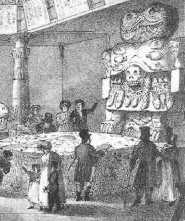Coatlicue statue

The Coatlicue statue is a 2.7 metre (8.9 ft) tall andesite statue usually identified with the Aztec goddess Coatlicue ("snakes-her-skirt"). It is currently located in the National Museum of Anthropology in Mexico City.
On the bottom of the statue, not normally visible, is a carving of Tlaltecuhtli ("earth-lord").
Discovery
The statue was discovered in the main plaza of Mexico City on 13 August 1790. The sun stone (also known as the "calendar stone") was found nearby on 17 December.
The first scholar to study the statue was Antonio de León y Gama, who incorrectly identified the god depicted as "Teoyamiqui" (i.e. Teoyaomiqui).[1]
Reactions
Criollos and Europeans regarded the statue as a horrible, deformed monster. Mexican Indians on the other hand began to worship it, visiting it with candles and adorning it with flowers. To prevent this, the statue was buried in the patio of the University of Mexico where it could not be seen.[2]

Copies
The statue was dug up in 1803, so that Alexander von Humboldt could make drawings and a cast, after which it was reburied. It was again dug up in 1823, so that William Bullock could make another cast, which was displayed the next year in the Egyptian Hall in Piccadilly, London, as part of Bullock's Ancient Mexico exhibition.[3]
Other statues
Another statue, called Yolotlicue ("heart-her-skirt"), was discovered in 1933. Though badly damaged, it is identical to Coatlicue except for having a skirt of hearts instead of snakes. Two fragments of a similar statue or statues also exist, suggesting that these were part of a larger set.[4]
References
- ↑ León y Gama, Antonio de (1792). Descripción histórica y cronológica de las dos piedras. México: Impr. de Don F. de Zúñiga y Ontiveros.
- ↑ Leask, Nigel (2004) [2002]. Curiosity and the Aesthetics of Travel Writing, 1770–1840: From an Antique Land. Oxford: Oxford University Press. pp. pp. 278, 313. ISBN 0-19-926930-0.
- ↑ Boone, Elizabeth Hill (1987). "Templo Mayor Research, 1521–1978". The Aztec Templo Mayor: A Symposium at Dumbarton Oaks, 8th and 9th October 1983. Washington, D.C: Dumbarton Oaks Research Library and Collection. pp. p. 25. ISBN 0-88402-149-1.
- ↑ Boone, Elizabeth Hill (1989). Incarnations of the Aztec Supernatural: The Image of Huitzilopochtli in Mexico and Europe. Philadelphia: The American Philosophical Society. pp. p. 47. ISBN 0-87169-792-0.